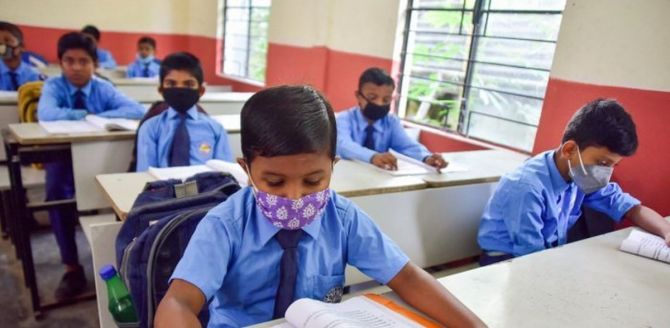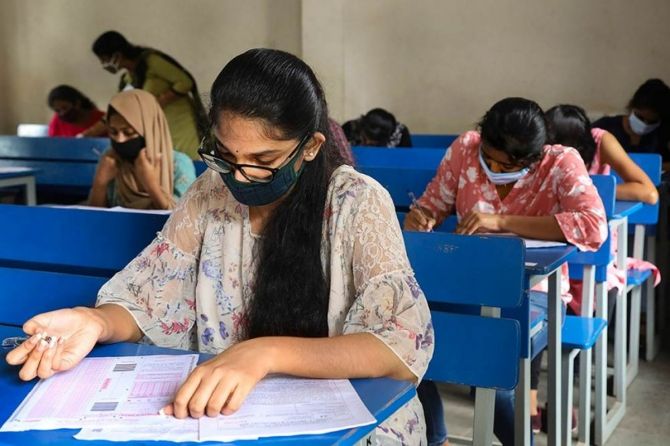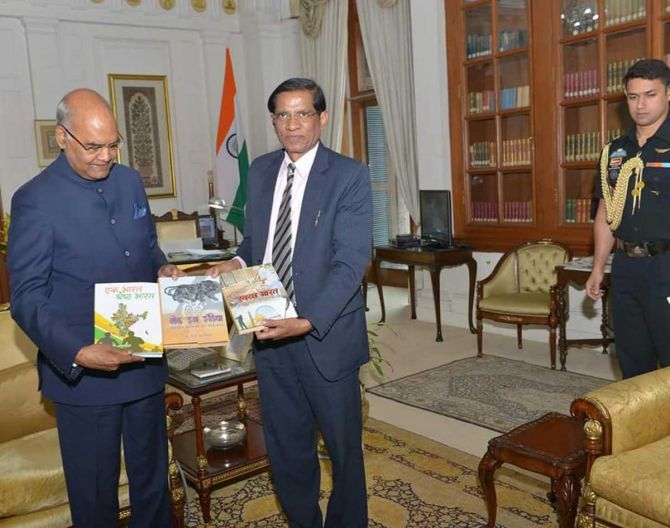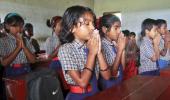'A mother, a farmer and cattle owner, all have valuable knowledge, but academia has failed to acknowledge their wisdom.'

"There are two kinds of scientists -- one belongs to the discipline of the pure sciences, they work in labs, teach science in classrooms and have earned certificates from universities. But there is also another set of scientists who work in fields, kitchens, take care of cows and buffaloes."
"The knowledge of the second set also has to be studied by the trained scientists of our academia."
Professor T V Kattimani is the first vice-chancellor of the Central Tribal University of Andhra Pradesh. The university aims to provide higher education and research facilities primarily for tribal students.
Professor Kattimani is a member of the National Education Policy and was previously vice chancellor of the Indira Gandhi National Tribal University, Amarkantak, Madhya Pradesh.
In an interview with Rediff.com's Archana Masih, Professor Kattimani speaks about the merits of imparting higher education in the mother tongue to tribal students and why the frugal innovations and skill sets of the poor have to be recognised by society.
There are concerns about the future of reservations because there is no mention of reservation in the New Education Policy. Do you think reservation can be abolished?
Questions were raised about the provision of reservation for SC/STs, OBCs, minorities, physically challenged. The chairman (Vice-President Muppavarapu Venkaiah Naidu) assured the House (the Rajya Sabha) that they will remain intact as they are and one can feel clear cut special provisions are recommended by NEP 2020.
The NEP gives emphasis to Socio-Economically, Disadvantaged Groups (SEDGs) through fellowships, scholarships, hostels etc. The government needs to clarify and define the categories or groups that will come under SEDGs. The lack of clarity on SEDGs is leading to concerns among the weaker sections about the provisions for them in the NEP.
How have the special provisions provided to SC/STs benefitted you in your personal journey?
I come from a poor tribal community. If there were no hostels for SCs/STs, I would not have been able to get an education and live the life I am today.
I am a member of the NEP and twice chancellor of a Central Tribal University.
It is my belief that special provisions/reservations should be extended to those who come from hard geographical areas and rural regions. It is not possible for students from these areas to compete with those who come from fortunate backgrounds.
The Government of India has created provisions for SEDGs, SC/STs, OBCs, women, transgenders, physically challenged and people from local language backgrounds.
Reservation has been given through SEDGs, but the government has to come up with a clear clarification that reservations will remain in place and list its provisions.
The government needs to define who/what comes under the SEDGs.

There has been a lot of discussion and criticism about adopting the local language or mother tongue as medium of instruction. Critics say it deprives students' access to education in English?
The scientific method of education shows that the medium of instruction in the mother tongue -- up to at least the sixth standard -- will help students from SC/ST background and also girls.
In fact, many people are discussing the benefits of using the mother tongue in higher education and research.
As vice chancellor of the Central Tribal University, I am of the firm belief that central universities, IITs, research institutes etc, should allow students to write research papers in their mother tongue.
This will go a long way in maintaining the originality of the research. For example, if someone is researching the medicinal value of millets in India, a lot of the researcher's time and energy goes into looking for English translations for local terms. This takes away from the core exercise and affects the quality of research. A lot of information gets lost in translation and thus deprives it from attaining Nobel Prize standards.
If research is written in the local language/mother tongue, won't it restrict its international reach?
It will reach international standards through translations done by experts. The NEP has given scope to make translation as part of curriculum and as an independent department.
The Department of Translations has faculty from multiple backgrounds. For example, I am planning a minimum of four languages in my university's department of translation, but if a student from my university writes a research paper in a fifth language, that paper can be sent to another central university which has a translator of that particular language.
By doing so, the art of translation and intellectual property will be shared with each other.
We should engage in national and international sharing of research material that will help articles written in Telugu or tribal languages like Lambadi, Soliga or Ho get translated and reach a much wider audience.
A classroom is not limited to four walls; it is a wide arena and there should be a holistic sharing system of educational material.
How do you think the use of mother tongue in higher education can bring a qualitative difference to the education system?
The mother tongue plays a very important role in higher education and advanced scientific research.
For example, the study of Botany is in English. Tribal students find it very difficult to learn the botanical names, but they know the local names of the same trees, flowers since childhood.
They have a pre-knowledge of the flora and fauna around them. They can tell the names of 100 trees, plants and flowers in their mother tongue, but may not remember the botanical names. At best, they will be able to tell 1-2 botanical names.
My mother tongue is Kannada and learning Hindi was a challenge for me. It took me 30 years to learn to read and write in Hindi.
It is much easier for students from disadvantaged backgrounds to learn in their own mother tongue. This is the biggest drawback for STs, Dalits and girl students.
Those working on the rights of SCs, STs, transgenders need to focus on these important aspects.

How can the knowledge of rural womenfolk, farmers, skilled labour be put to better use and recognised by academics?
The intrinsic knowledge of STs, SCs and women needs to acknowledged and shared.
The academia has overlooked the woman's art of managing a home, her ability to make different kinds of cuisine. Culinary art and family management should be included as a part of education because home maintenance is a science and an art.
Academicians never considered it important or worthy and thought homemaking was the duty of a woman.
Culinary art can only be successful when womenfolk enter into this domain.
Primary education is domain of the female. A mother is the first teacher even though she may not have a certificate.
My mother did not have a certificate, but was a great teacher. A certificate or degree cannot be the sole proof of education. Knowledge is not about certificates and medals alone.
A mother, a farmer and cattle owner, all have valuable knowledge, but academia has failed to acknowledge the wisdom of people in the fields, or workshops.
Now, the NEP has recognised this as a part of education.
There are two kinds of scientists -- one belongs to the discipline of the pure sciences, they work in labs, teach science in classrooms and have earned certificates from universities. But there is also another set of scientists who work in fields, kitchens, take care of cows and buffaloes.
The knowledge of the second set also has to be studied by the trained scientists of our academia.
The National Innovation Foundation has over 2 lakh innovators working for the society. NEP has seriously taken into account the contributions of such people.
MNREGA considers everyone as unskilled labour -- that idea needs to change. If 4 lakh workers come under MNREGA, not all are unskilled, some are skilled, but no attempt has been made to revisit the guidelines.
Those working under MNREGA may have the skills of rain water harvesting, woodcraft, cattle rearing etc -- these skills they carry in their head and heart.
These skill sets of the poor have to be recognised by society. These people who don't have certain skill sets are also our technocrats and scientists.
Our academia, science institutes and finally the industries have to understand the innovations and applicability of the frugal innovators by accepting their innovations especially in science, technology, agriculture and health which will be much cheaper and go a long way in serving the poorest.
Feature Presentation: Aslam Hunani/Rediff.com










